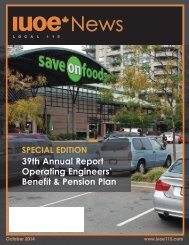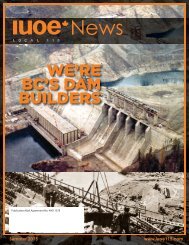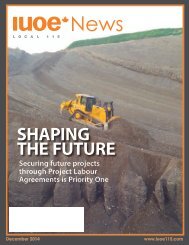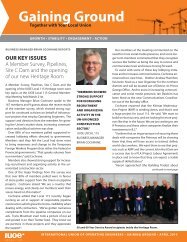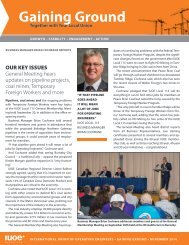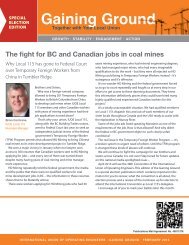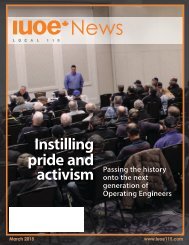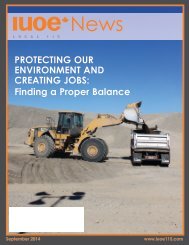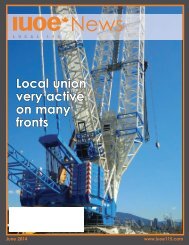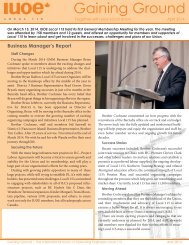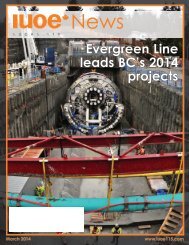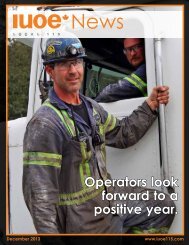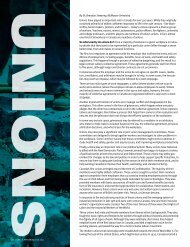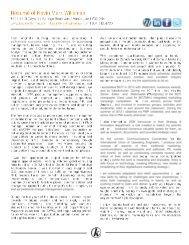IUOE News Fall 2013
The Fall 2013 Edition of the OE News, quarterly publication of the International Union of Operating Engineers Local 115.
The Fall 2013 Edition of the OE News, quarterly publication of the International Union of Operating Engineers Local 115.
You also want an ePaper? Increase the reach of your titles
YUMPU automatically turns print PDFs into web optimized ePapers that Google loves.
Member Profile<br />
Kasper Mayer:<br />
Keeping it Local, Keeping it Union<br />
While legions of construction<br />
workers often have to endure working<br />
far away from their homes, families,<br />
and their communities to earn a living,<br />
Kasper Mayer believes it is possible to<br />
beat the odds.<br />
And he should know, as a 56-year<br />
resident of the Kootenays and 50-year<br />
member of the Operating Engineers<br />
Local 115.<br />
The now-retired heavy equipment<br />
operator, former business representative<br />
and elected board member, as well<br />
as a health and welfare plan trustee for<br />
the Local 115’s District 6 has acquired a<br />
wealth of experience in the construction<br />
sector—and all of it within driving<br />
distance of his home.<br />
“It’s possible to do. You need to be<br />
multi-skilled and willing to take any<br />
job,” says Mayer. “A lot of guys will get<br />
a call from the union’s dispatch for a<br />
34 <strong>News</strong> October <strong>2013</strong><br />
three-day job and will turn it down,<br />
waiting for the big six-month jobs to<br />
come along. But sometimes that threeday<br />
job turns out to be a year.”<br />
Mayer adds, however, that a lot has<br />
changed in the industry since he<br />
started out in 1963 at the age of 23.<br />
At that time, he was looking for a<br />
career. His two older brothers—<br />
Edward and the late Albert—were<br />
Local 115<br />
members and<br />
encouraged<br />
him to get into<br />
trades, and the<br />
union.<br />
“Albert was a shovel operator and<br />
Edward was an oiler (equipment<br />
servicing),” he says. “They liked what<br />
they were doing and earned a living<br />
doing it, so I got interested.”<br />
Mayer started off as a grademan,<br />
reading engineer layout plans and<br />
working with equipment operators to<br />
check excavation levels to make sure<br />
they were accurate. This was, and still<br />
is, an especially important task in road<br />
building projects, and ended up<br />
becoming where he spent much of his<br />
working career.<br />
But Mayer also remembers how at<br />
that time, training and union membership<br />
were much less formal or<br />
automated than today.<br />
“This was before we had the OE<br />
training plan,” Mayer says. “Then you<br />
learned on the job, by the seat of your<br />
pants, with the guidance of older<br />
members. Either you got it or you got<br />
out.”<br />
Even joining the union wasn’t the<br />
relatively straight-forward process it is<br />
now. “In those days, you had to be<br />
sponsored by a member to join the<br />
union. You applied and then went to a<br />
membership meeting. They all asked<br />
you questions. Then they kicked you<br />
out and had a vote on whether to let<br />
you in” says Mayer.<br />
After his hard-fought acceptance,<br />
Mayer signed up to learn to operate a<br />
scraper on a local road project. Soon<br />
after, he was working on a variety of<br />
jobs—road building, bridge work, and<br />
BC Hydro projects, which he says were<br />
a huge part of the construction scene in<br />
the Kootenays<br />
in the 1960s<br />
and 70s. This<br />
was in addition<br />
to highway<br />
work and later<br />
building and expanding the major coal<br />
mines in the region, such as the<br />
Fording, Green Hills and Line Creek<br />
facilities.<br />
“When I got into the industry, there<br />
was no Highway 3 from Castlegar on<br />
(East). There was no Rogers Pass. All<br />
we had were ferries and rail,” he recalls.<br />
Working on these projects gave him<br />
the chance to expand his knowledge of<br />
equipment operating to bulldozers,<br />
loaders and various types of cranes. It<br />
also got him elected as a shop steward—<br />
back then known by many as a<br />
“Shoppy”—on many jobs.<br />
Becoming a Shoppy is what led<br />
Mayer to run for a position on the<br />
District 6 board in 1980. He continued<br />
to work as an equipment operator and<br />
steward until he was offered a staff<br />
position as a business rep in 1983.<br />
Mayer accepted the job, albeit with<br />
some reservation, as his duties would<br />
include advocating and assisting Local<br />
115 members outside the construction<br />
sector, especially since workers at some<br />
of the mines had joined the local as<br />
well.<br />
“I worked in construction, so I felt<br />
good about being a rep for<br />
“Back then you learned on the<br />
job, by the seat of your pants, with<br />
the guidance of older members.<br />
Either you got it or you got out.”




